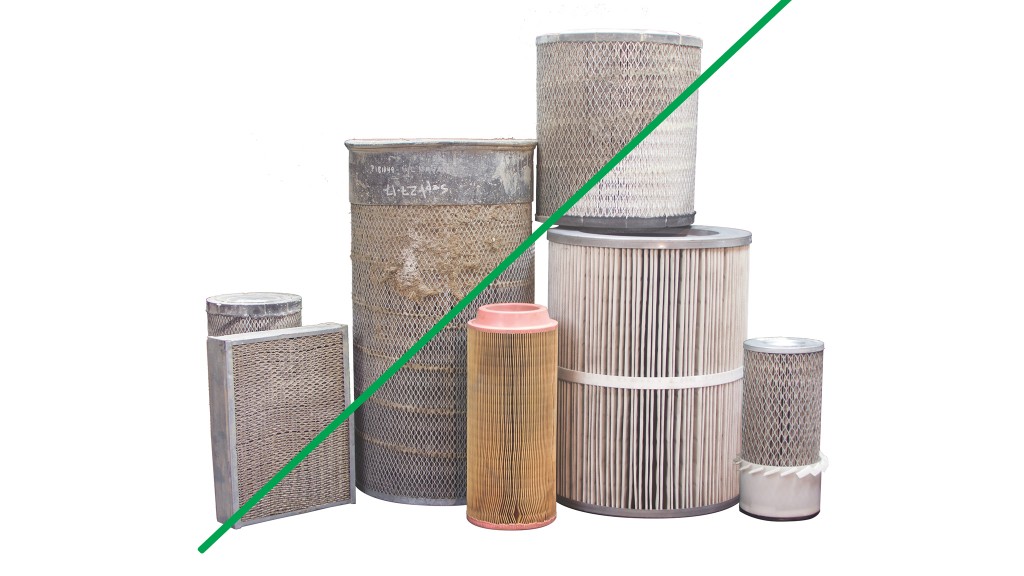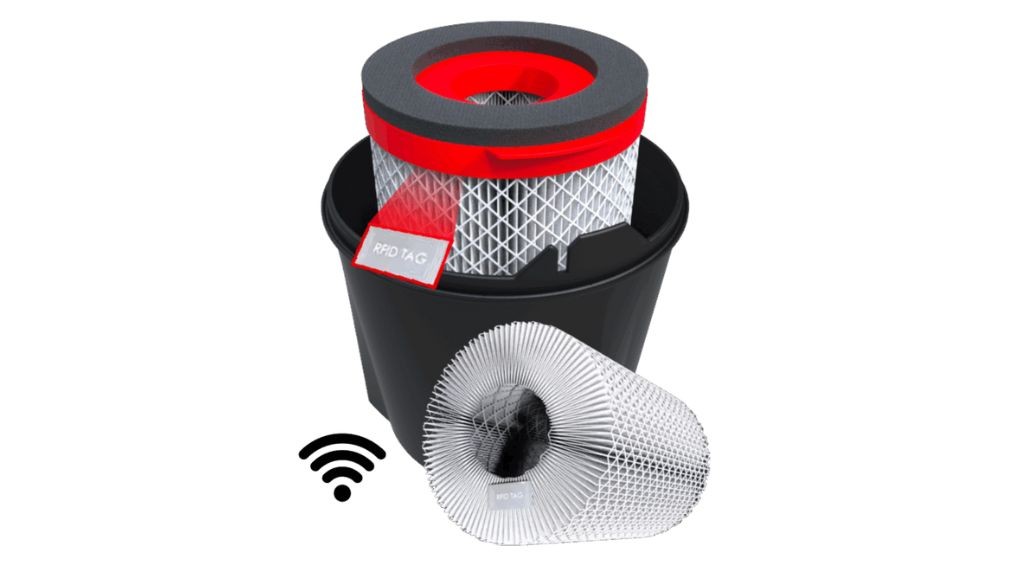How to optimize filter maintenance
Robinson’s Filter Solutions cuts costs and waste one filter at a time

In the world of heavy equipment, where operational downtime and maintenance costs can erode project margins, air filtration may not be the first place contractors look to optimize performance. According to Robinson's Filter Solutions (RFS), that's precisely where the opportunity exists. This Ontario-based, family-run business is transforming how filters are maintained and reused in heavy equipment and industrial settings — saving customers money, minimizing downtime, and diverting thousands of filters from landfills each year.
Founded in 1994 as Air Filter Exchange, the company was purchased by Lloyd and Erin Robinson in 2004. "Lloyd was working as a millwright at a local lumber mill," Erin explains, "and had a business relationship with the original owner. One day, the previous owner came to Lloyd and said, ‘You want to buy a business?'"
"He was overwhelmed, and we were young and naïve enough to give it a shot," adds Lloyd.
Erin, who was driving a school bus and raising their three young children at the time, put together the business plan with help from a friend at the bank. With minimal experience but a strong entrepreneurial drive rooted in family tradition, the Robinsons took over and began growing the business from their rural base.
Growing a niche business
After renaming the company Robinson's Air Filter Exchange (RAFE) Inc., the Robinsons expanded by acquiring and incorporating four regional competitors between 2006 and 2017. According to Erin, some of these acquisitions were driven less by market share and more by quality control. "What we do is very niche," she says. "If someone's doing it poorly, it affects the whole industry. We bought one of our early competitors just to get them to stop doing it badly."
In 2017, after a decade of growth and strategic refinement, the company rebranded for the final time as Robinson's Filter Solutions to reflect its evolving services.
Today, RFS operates a centralized cleaning facility in Combermere, Ontario, supported by a route-based pickup and delivery system that spans Eastern Ontario and parts of Quebec. Filters are collected on a scheduled basis according to each company's needs, then are cleaned, inspected, tracked, and returned within a two-week turnaround in many cases.
"Customers don't call us for pickup," Lloyd explains. "They're on a schedule — monthly, quarterly, annually — and we manage that cycle."
How does the refurbishing process work?
At the heart of Robinson's business is its proprietary refurbishing process for air filters used in everything from loaders and haul trucks to crushers and plant ventilation systems. Filters are tagged with a barcode on arrival, tracking how many times they've been cleaned and which customer they belong to. They are then cleaned using a combination of mechanical agitation, centrifugal force, and compressed air in a specialized McWinn cleaning machine — a Canadian-made system out of Edmonton.
"All inspections are done by hand," says Lloyd. The process uses high-powered lights to detect even pinhole imperfections in the filter media. Some filters are manually cleaned in special bays if they're non-cylindrical or too delicate for the machine.
Rejected filters are removed from circulation, and a record is kept for the customer. In some cases, replacements are automatically ordered and shipped out to avoid disruptions.
While many filters can be cleaned up to eight times, Lloyd notes that filter longevity depends heavily on the application. "We've cleaned some filters over 25 times. Others can't even go through once — it depends on the environment, the kind of dust, whether it's been wet, and how it's handled. Many times, when a filter is rejected, it is due to human error, like being dropped or mishandled."
Tim Greene, a sales consultant at RFS, added that the company references a third-party white paper that benchmarks the performance of new filters against those that have been cleaned up to eight times. "The airflow performance is identical," says Greene. "And in some cases, cleaned filters perform slightly better because they've been seasoned. The structure is more efficient after use. And in terms of air flow, it has the same performance value that meets the standard that the OEM has."
Meeting the needs of heavy industry
RFS serves both the industrial and heavy equipment markets. In 2004, nearly 95 percent of their business was heavy-equipment-based. Since then, they've expanded into industrial manufacturing, which now accounts for roughly half of their filter cleaning volume. The company also offers new filter sales and onsite service, including preventive maintenance and filter changes.
"Our ideal customers are those with high turnover," Lloyd explains. "Sand and gravel operations, for example, may change filters daily on a crusher. The savings really add up."
Even small operators benefit. "Because our trucks are already on the road servicing major clients, we can pick up two or three filters from a small outfit and provide the same service," Greene says. "Everyone pays about 50 percent of what they'd pay for a new filter based on their own buying power."
RFS works with all makes and models of air filters used in commercial and industrial equipment. They do not service oil-soaked or hazardous filters and do not work with residential HVAC filters.
What does filter refurbishing mean for the environment?
Robinson's environmental commitment is embedded in both their mission and daily operations. Every refurbished filter represents one less disposable item in a landfill, and RFS also reuses original packaging when possible.
"If you're changing a filter every month, that's 12 filters a year," says Lloyd. "But if we can clean and reuse that same filter eight times, you're only disposing of one or two instead of 12. Plus, you're saving all the packaging that would have gone with them."
Only about 10 percent of rejected filters are sent to the landfill. About 90 percent of rejected filters are recycled for scrap metal. Rubber-ended or composite filters, which are harder to process, cannot be recycled at this time.
RFS is currently exploring the feasibility of calculating its total carbon footprint — a process that could cost $50,000 to $70,000. "We'd like to have data to back up the environmental value we're offering," says Lloyd. "Right now, it's just common sense, but we want science behind it too."
Technology and accountability
Beyond the equipment itself, RFS has invested heavily in technology to monitor internal productivity and ensure consistent service quality. The company's custom software was originally developed to track filters as they moved through each stage of the cleaning process, including barcode scanning, cleaning duration, and inspection outcomes.
"It wasn't something we could buy off the shelf. It had to be built for our process," says Erin. "Now, we also use it to track technician efficiency and product quality, which helps us stay accountable and support our team's growth."
A unique model for customer service
Growing a business in rural Ontario has shaped Robinson's Filter Solutions into a company that prioritizes relationships as much as results. In a region where word-of-mouth still drives business and trust is earned through action, RFS has built its reputation by delivering a level of customer service that often extends beyond filtration.
"We work in places where business is still built on relationships," says Erin. "Customers expect to know who they're dealing with." That connection often translates into going the extra mile.
When one customer faced a staffing shortage, RFS assigned two of their employees to help with basic labour — sweeping floors and shovelling sawdust — just to keep the client's operation running smoothly. "It's not what we do day-to-day, but they needed help, and we had the people," Lloyd says.
That same flexibility is evident in how Lloyd, a trained millwright, approaches site visits. If he sees a mechanical issue, such as an airflow problem that's not related to filtration, he steps in to offer solutions. "Customers rely on him not just for air filters, but for his expertise and ability to troubleshoot," says Erin. "It's part of why our retention rate is so high."
In rural areas where service providers are fewer and farther between, RFS's hands-on, relationship-driven model has become a differentiator. "We're not corporate and cold," Erin says. "We show up, we get dirty, and we do what needs to be done."
Planning for the future
Asher Robinson, the Robinsons' son, has joined the company as a sales rep and is helping to refine the sales process with an eye toward future expansion. "We're working on documenting everything we do so that we can eventually replicate it in other locations," says Asher.
Lloyd and Erin envision RFS growing into a network of company-owned satellite facilities that are not franchised, but centrally managed. "We've spent the last few years really locking down our people, processes, and systems," Lloyd says. "We're now at the point where we could scale it."
The company is exploring additional service areas in southwestern Ontario and beyond. They're also open to expanding their range of services based on customer needs, including odd jobs that fall outside filtration. "If a customer needs help changing a bearing or sweeping a floor, and we can help, we do it," says Lloyd.
With over two decades of experience, a deeply ingrained commitment to sustainability, and a willingness to evolve with the needs of their clients, Robinson's Filter Solutions has carved out a unique niche in the heavy equipment and industrial sectors. Their promise is simple but has impact: Save time, save money, and reduce environmental waste — one filter at a time.



